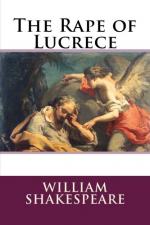|
This section contains 1,324 words (approx. 5 pages at 300 words per page) |

|
The Rape of Lucrece
Summary: In the poem The Rape of Lucrece by William Shakespeare, the emphasis is more on the results of the rape than on the rape itself. Shakespeare uses literary techniques such as irony to convey the psychological aspects of the story. The poem is analyzed as a study on the effects of rape.
Shakespeare's poem "The Rape of Lucrece" tells the historic story of Lucrece's rape by Tarquin, a member of the royal family of Rome. However, the actual action of rape receives little emphasis in the poem. Instead, Shakespeare focuses on Lucrece's reaction, especially in her suicide. In modeling Lucrece's response to rape, as well as in concluding the narration, Shakespeare uses techniques such as irony and deus ex machina. Using common literary techniques Shakespeare presents the story, not of rape, but of its results.
Shakespeare's representation of the rape itself shows that he does not consider it a major theme of the story. For example, after Tarquin has entered Lucrece's bedchamber and stated his intentions, the poem reads:
O, that prone lust should stain so pure a bed!
The spots whereof could weeping purify,
Her tears should drop on them perpetually.
But she hath lost a dearer thing than...
|
This section contains 1,324 words (approx. 5 pages at 300 words per page) |

|


